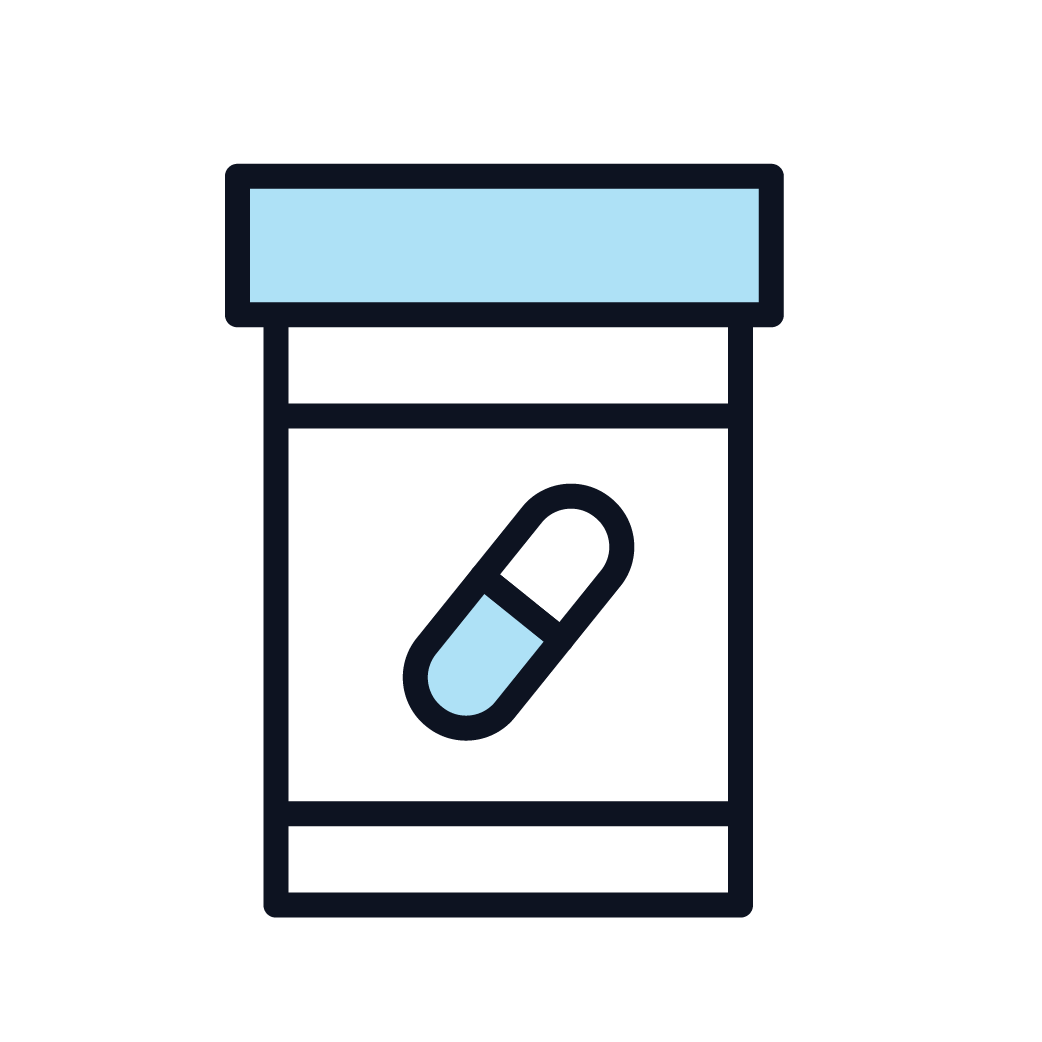
Medically Reviewed by: Kenyatta M. Cosby, MD | May 21st, 2024
The typical mesothelioma treatment plan will include several medications tailored to the individual’s needs. Chemotherapy medications like pemetrexed, cisplatin, and carboplatin are commonly the first line of treatment for patients, though targeted therapy and immunotherapy drugs may also be prescribed in combination.
Medically Reviewed by: Kenyatta M. Cosby, MD, | May 21st, 2024
Medications and chemotherapy drugs are typically the most effective when choosing a treatment method most likely to treat mesothelioma. However, several additional anti-cancer drugs are often paired together for treatment. Once an oncologist diagnoses a patient with asbestos-related mesothelioma, he or she will develop a treatment plan.
Mesothelioma medications typically fall into one of three types: chemotherapy, immunotherapy, and other. All medications have the potential for side effects but are not prescribed without weighing all potential risks and benefits for the patient. In this article, we will break down each of those types and the associated medications that you should be aware of.
Deciding which mesothelioma treatment to use hinges on several factors: how far the disease has spread in the lung, chest, or heart membranes, the patient’s medical history, personal history (including exposure to asbestos and other lung contaminants or cancer-causing carcinogens), and the patient’s current medical standing. Specialists perform specific tests to determine the majority of this information.
A mesothelioma treatment program may include a combination of medical medications and therapies, including chemotherapy, radiation, or emerging treatments, for an optimal medical outcome. Generally, treatment for mesothelioma begins with a focus on the disease source (i.e., the lining of the lung, abdomen, or heart) and includes:
Specialists administer chemotherapy to mesothelioma patients in multiple ways. Typically, administration depends on how far the cancer has spread, its location, and other health factors. For instance, pleural mesothelioma of the lung may require a biopsy of the lung tissue and the nearby chest cavity. Extensive evaluations may be conducted to find the best combination of chemotherapeutic agents for maximum efficacy. Currently, the best results are combining surgery with chemotherapy treatment.
Often, chemotherapy is paired with anti-cancer drugs for maximum effect. There are several different types of chemotherapy medications used to treat mesothelioma. Some of those include:

Systemic chemotherapy involves administering chemotherapeutic medication into the bloodstream through the vein of a specialist. Unlike some localized cancer treatments, chemotherapy drugs travel throughout the body, aiming to kill cancer cells wherever they may be hiding. Combination chemotherapy, which uses two or more drugs simultaneously, is often the most effective course of treatment for mesothelioma.
The specific drugs used will depend on the type of mesothelioma and the patient’s medical condition. While chemotherapy can cause side effects like fatigue, nausea, and vomiting, these are usually manageable with medication and supportive care. It’s important to discuss the potential risks and benefits of chemotherapy with your doctor to decide if it’s the right treatment for you.

Chemotherapy drugs can be administered directly into the pleura, or chest cavity, or into the peritoneum, the abdominal cavity. Doctors use a catheter for this treatment, placing it through a small incision located in the chest or abdominal wall. This targeted approach aims to deliver a high dose of chemotherapy drugs to cancer cells in the lining of these cavities. However, it’s important to note that this approach is unsuitable for all patients.

Chemotherapy is often used in combination with other medications or treatments. If the tumors are small enough, chemotherapy works as a standalone treatment. Chemotherapy can also be used after radiation and surgery to attack microscopic cancer cells not visible to the naked eye. Additionally, chemotherapy helps prepare patients for different treatment methods, such as shrinking a tumor before surgery, known as neoadjuvant therapy. Finally, in cases where the tumor is unresectable, chemo helps relieve cancer symptoms or extend survival, also known as palliative chemotherapy.

Chemo medications are designed to attack and kill rapidly dividing cells. Unfortunately, cancer cells aren’t the only cells in the body that divide quickly. Bone marrow, the lining of the mouth and intestines, and hair follicles all contain cells that divide rapidly. This can lead to several potential side effects:
Doctors and mesothelioma specialists use multiple methods and medications to mitigate complications and relieve the side effects of chemotherapy. Talk to your physician about different options based on your specific case. However, the side effects usually wear off after the treatment cycle.
Immunotherapy is another type of targeted therapy that has grown quite popular because of its success. The treatment medications target the patient’s immune system to fight cancer. This treatment stimulates the immune system to work more efficiently, attacking cancerous cells and boosting the immune system with useful additives, including human-engineered immune system proteins. Some of the currently used immunotherapy drugs include Keytruda (Pembrolizumab), Nivolumab (Opdivo), and Ipilimumab (Yervoy).
Researchers are still testing multiple different immunotherapy treatments in clinical trials:
Doctors and researchers target the immune system using several different methods. These include immune checkpoint inhibition, cancer vaccines, and other forms of immunotherapies. Some approaches use various methods like immune checkpoint blockade, which removes breaks in immune cells. Cancer vaccines also train the immune system to target specific cancers. Other techniques include engineering supercharged immune cells or using immune system messengers to ramp up the fight against cancer.
Unlike chemotherapy, which attacks both healthy and cancerous cells, immunotherapy offers a more targeted approach with fewer side effects. When doctors administer immunotherapies, they strengthen the body’s defenses and enable white blood cells to locate and kill cancer cells. But, like with most treatment methods, even immunotherapy is associated with some side effects.
Most of these side effects are mild, but serious, life-threatening complications can happen. If you ever visit the emergency department or meet a new doctor while on immunotherapy, it is important to let the doctors know you are taking immunotherapy. Some institutions provide patients with legal medical cards to carry on them with the names of the medications in case they need to visit the Emergency Department with new, unusual, or severe symptoms. The side effects of immunotherapy include:
Unlike chemotherapy, which uses medications to treat cancer by attacking all cells, targeted therapy attacks cancer-specific genes, proteins, or the tissue environment that aids in cancer growth and survival. Currently, scientists and physicians are exploring multiple targets for treating mesothelioma of the lung, heart, and abdominal cavities. Examples of types of targeted therapy include:

Angiogenesis is the creation of new blood vessels and is a normal function of healing and growth in the body. Unfortunately, if a person has cancer, angiogenesis also helps cancer cells multiply and spread. When new blood vessels form, they carry blood containing nutrients and oxygen to the tumors, enabling them to grow.
Anti-angiogenesis drugs stop the growth of new blood vessels, blocking angiogenesis, consequently “starving” the tumors and stunting their ability to grow and spread to other parts of the body. Angiogenesis inhibitors, also known as small-molecule drugs, include:

Another type of anti-angiogenesis drug is a monoclonal antibody. These lab-made proteins mimic the body’s immune system by targeting specific molecules involved in blood vessel growth. This targeted approach can help block tumors from forming new blood vessels and hinder their ability to grow and spread. They’re also a form of immunotherapy and are used as a substitute for immune system proteins to destroy cancer cells. These antibodies are designed to attack specific areas of diseased cells. Monoclonal antibodies are also used in combination with chemo and radiation therapies.

The Epidermal Growth Factor Receptor (EGFR) is a protein that, when overexpressed in cancer cells, leads to uncontrolled cell growth. EGFR inhibitors are targeted therapy drugs that block this receptor, preventing cancer cell growth and proliferation.
These inhibitors control the progression of cancers, including mesothelioma and asbestosis, by stopping growth signals from reaching the cancer cells. By targeting the EGFR pathway, these drugs can help reduce tumor growth in cancers with high EGFR activity. Key medications used in clinical trials for mesothelioma include:

Unlike traditional chemotherapy, which targets all rapidly dividing cells, targeted therapy treatment methods offer a more precise approach to fighting mesothelioma or an asbestos-caused disease. These therapies target specific abnormalities within cancer cells, such as mutated genes or proteins. By targeting specific vulnerabilities, targeted therapies can be highly effective in shrinking tumors and controlling the disease.
Because healthy cells are largely unaffected, targeted therapies typically cause milder side effects compared to chemotherapy. This allows patients to tolerate treatment better and maintain a higher quality of life. However, it’s important to note that targeted therapies may not be suitable for all mesothelioma cases, and some side effects can still occur.

Targeted therapy inhibits normal cell functions to attack cancer. It’s important to note that the side effects you experience will depend on the type of targeted therapy medication you are taking and your overall situation. Be sure to discuss any side effects you experience with a licensed doctor, as there may be ways to manage them and improve your quality of life during treatment. Discussing other possible complications with your doctor is also important. Side effects can include:
Photodynamic therapy (PDT) is a targeted treatment that combines a photosensitizer or photosensitizing agent with light to target and destroy specific abnormal cells. PDT works when the photosensitizers are exposed to particular wavelengths of light that cause the formation of oxygen, consequently killing cancer cells.
Historically, photodynamic therapy medications have improved the prognosis of mesothelioma caused by asbestos. Since the wavelength determines how far the light travels into the body, doctors use wavelengths and photosensitizers to project the light into different body areas. Porfimer sodium (Photofrin) is a medication used explicitly to treat mesothelioma.
Photodynamic therapy (PDT) can cause significant photosensitivity, particularly when using porfimer sodium (Photofrin), making the eyes and skin extremely sensitive to light for about six weeks post-treatment. People who receive this type of treatment should avoid direct sunlight and bright indoor lights during this period to prevent severe skin reactions. Other side effects may include localized reactions such as swelling, redness, and pain at the treatment site, as well as systemic symptoms like fatigue and nausea. For lung-related treatments, temporary shortness of breath or cough can occur.
While there are no radiation-specific medications, except for medications administered to relieve radiation side effects, anti-cancer drugs are paired with radiation treatment as a form of neoadjuvant therapy. For example, oncologists will administer chemotherapeutic medications to shrink tumors before radiation treatment.
Radiation treatment is also used after surgery to kill the remaining cancer cells. This form of therapy utilizes high-energy beams from X-rays and protons to target specific body areas. In advanced stages of cancer, radiation may be used to minimize signs and symptoms.
Clinical trials are a critical pillar of mesothelioma research. These studies allow doctors to discover innovative ways to improve a person with mesothelioma’s quality of life in a safe and legal environment. Clinical trials are also available for patients at every stage (not simply advanced stages) and those with recent asbestos exposure. Some mesothelioma medications being tested in clinical trials are:
Clinical trials help researchers experiment legally with new ways to prevent exposure, diagnose cancer, treat and manage symptoms and side effects of cancer, and develop better treatment. Presently, researchers are working on ways to detect damage done by asbestos exposure sooner and give more quality years to patients in the late stages of mesothelioma and lung cancer. There are many clinical trials available for mesothelioma patients. Visit ClinicalTrials.gov for a complete list of legal ongoing and completed trials and their locations. Clinical trial side effects vary based on the type and combination of medications and therapies, so it’s important to consult your doctor before making any decisions.
While clinical trials offer promising new treatments for mesothelioma at any stage, they come with drawbacks. Recruiting qualified patients can be difficult, and trials may involve out-of-pocket costs. The new medications or therapies haven’t been fully tested, so their effectiveness and side effects are uncertain. Before enrolling in a clinical trial, weighing these challenges alongside potential benefits is important.
Effective treatment of mesothelioma involves a multifaceted approach combining medications, chemotherapy, immunotherapy, targeted therapies, photodynamic therapy, and radiation. Each method is chosen based on the patient’s unique medical history, the cancer’s progression, and specific diagnostic tests. While traditional treatments like chemotherapy and emerging treatments such as immunotherapy and targeted therapies offer hope, ongoing clinical trials continue to explore new options. Understanding and discussing the potential side effects with healthcare providers is crucial for managing treatment effectively and improving the patient’s quality of life. If you need resources connecting you to legal and medical professionals, we can help you.
Jennifer Verta thrives as a digital content writer at Mesothelioma Hub. She has been producing content for clients since before she graduated from the University of Colorado at Denver with a Bachelor of Arts in Communication and a Minor in English Writing. Jen’s mission is to help promote awareness of mesothelioma to as many people as possible by providing only the most up-to-date and accurate content available. When she isn’t cranking the gears at work, Jen can be found snowboarding, hiking, catching live music, or socializing with friends.

Dr. Kenyatta M. Cosby is a Physician Scientist and Scientific Consultant based in Rockville, Maryland, U.S.A. He obtained his medical degree from Howard University College of Medicine. He completed research training at the National Heart Lung Blood Institute / National Institutes of Health (NIH) and Johns Hopkins University School of Medicine. Dr. Cosby holds a medical degree from Howard University College of Medicine and received research training at the National Heart Lung Blood Institute / National Institutes of Health (NIH) and Johns Hopkins University School of Medicine. He actively collaborates with other medical experts from various sectors to strive for clinical excellence in translational medicine. Mesothelioma Hub is proud to have Dr. Cosby as a part of the medical reviewer team.
American Cancer Society. (2018). Chemotherapy for Malignant Mesothelioma. Retrieved on August 8th, 2019, from https://cancer.org/cancer/malignant-mesothelioma/treating/chemotherapy.html
American Cancer Society. (2018). Radiation Therapy for Malignant Mesothelioma. Retrieved on August, 8th, 2019, from https://cancer.org/cancer/malignant-mesothelioma/treating/radiation.html
American Cancer Society. (2018). Targeted Therapy for Malignant Mesothelioma. Retrieved on August 12, 2019, from https://cancer.org/cancer/malignant-mesothelioma/treating/targeted-therapy.html
American Cancer Society. (2019). Treatment of Mesothelioma Based on the Extent of the Cancer. Retrieved on August 9th, 2019 from https://cancer.org/cancer/malignant-mesothelioma/treating/by-extent.html
American Cancer Society. (2016). What Is Cancer Immunotherapy? Retrieved on August, 8th, 2019, from https://cancer.org/treatment/treatments-and-side-effects/treatment-types/immunotherapy/what-is-immunotherapy.html
British Journal of Cancer. (1996). Response of Photofrin-sensitized mesothelioma xenografts to photodynamic therapy with 514 nm light. Retrieved on August 9th, 2019, from https://ncbi.nlm.nih.gov/pmc/articles/PMC2075818/
Cancer.Net. (2018). Angiogenesis and Angiogenesis Inhibitors to Treat Cancer. Retrieved on August 8th, 2019, from https://cancer.net/navigating-cancer-care/how-cancer-treated/personalized-and-targeted-therapies/angiogenesis-and-angiogenesis-inhibitors-treat-cancer
Cancer.Net. (2019). Lung Cancer – Non-Small Cell: Types of Treatment. Retrieved on August 12, 2019, from https://cancer.net/cancer-types/lung-cancer-non-small-cell/types-treatment
National Cancer Institute. (2011). Photodynamic Therapy for Cancer. Retrieved on August, 8th, 2019, from https://cancer.gov/about-cancer/treatment/types/surgery/photodynamic-fact-sheet
National Cancer Institute. (2019). Treatment Clinical Trials for Mesothelioma. Retrieved on August 8th, 2019, from https://cancer.gov/about-cancer/treatment/clinical-trials/disease/mesothelioma/treatment
National Cancer Institute. (2019). What Are Clinical Trials? Retrieved on August 8th, 2019, from https://cancer.gov/about-cancer/treatment/clinical-trials/what-are-trials
Cancer.Net. (2019). Understanding Targeted Therapy. Retrieved on August 8th, 2019, from https://cancer.net/navigating-cancer-care/how-cancer-treated/personalized-and-targeted-therapies/understanding-targeted-therapy
Mayo Clinic. (2017). Chemotherapy. Retrieved on August 8th, 2019, from https://mayoclinic.org/tests-procedures/chemotherapy/about/pac-20385033
Mayo Clinic. (2019). Mesothelioma. Retrieved on August 8th, 2019, from https://mayoclinic.org/diseases-conditions/mesothelioma/diagnosis-treatment/drc-20375028
Mayo Clinic. (2018). Radiation Therapy. Retrieved on August 8th, 2019, from https://mayoclinic.org/tests-procedures/radiation-therapy/about/pac-20385162
Porter, L. (2018) What You Need to Know About Immunotherapy Side Effects. Retrieved on August 9th, 2019, from https://cancer.net/blog/2018-02/what-you-need-know-about-immunotherapy-side-effects
WebMD. (2019). Immunotherapy Treatment for Mesothelioma. Retrieved on August 9, 2019 from https://webmd.com/lung-cancer/mesothelioma-immunotherapy#1
Yuji T., MD, PhD, et al. (2015). Molecular-Targeted Therapy for Malignant Mesothelioma. Retrieved on August 12, 2019, from https://journals.sagepub.com/doi/pdf/10.1177/2373997515600403